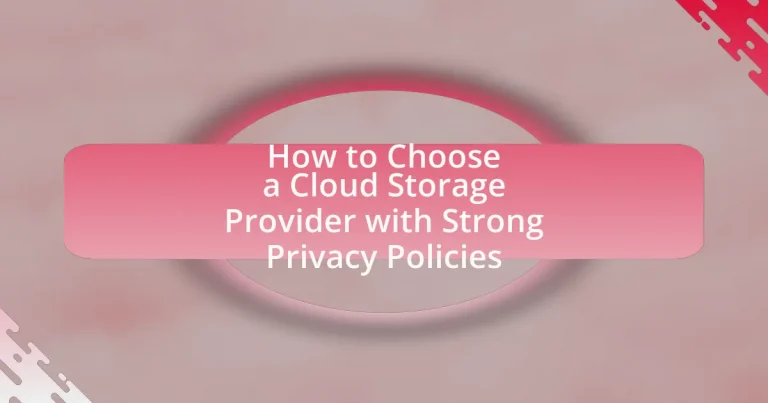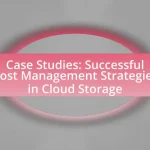Choosing a cloud storage provider with strong privacy policies is essential for safeguarding personal data. Key considerations include the provider’s data encryption practices, compliance with privacy regulations such as GDPR and HIPAA, and transparency in data handling. Effective privacy policies should outline data collection, usage, sharing practices, and user rights, while also detailing security measures and data retention policies. Additionally, evaluating the provider’s track record on data breaches and seeking third-party audits can further inform users about their commitment to privacy and data security.
What Should You Consider When Choosing a Cloud Storage Provider with Strong Privacy Policies?
When choosing a cloud storage provider with strong privacy policies, consider the provider’s data encryption practices. Effective encryption ensures that your data is protected both in transit and at rest, making it inaccessible to unauthorized users. Additionally, review the provider’s compliance with privacy regulations such as GDPR or HIPAA, which indicates their commitment to safeguarding personal information. Transparency in data handling practices, including how data is stored, shared, and deleted, is also crucial. Providers that offer clear privacy policies and user control over data access enhance trust. Lastly, assess the provider’s track record regarding data breaches; a history of strong security measures and prompt incident response can indicate reliability in protecting your data privacy.
How do privacy policies impact your data security in cloud storage?
Privacy policies significantly impact data security in cloud storage by outlining how user data is collected, used, and protected. These policies define the measures a cloud provider implements to safeguard data, such as encryption standards, access controls, and data breach protocols. For instance, a provider with a robust privacy policy may employ end-to-end encryption, ensuring that data is secure both in transit and at rest, thereby reducing the risk of unauthorized access. Additionally, clear privacy policies inform users about their rights regarding data ownership and deletion, which can enhance user trust and compliance with regulations like GDPR. Thus, the strength and clarity of a cloud storage provider’s privacy policy directly correlate with the overall security of user data.
What key elements should be included in a strong privacy policy?
A strong privacy policy should include key elements such as data collection practices, data usage, data sharing, user rights, data security measures, and contact information. These elements provide transparency about how personal information is handled. For instance, specifying what types of data are collected (e.g., personal identification, usage data) informs users about the scope of data collection. Additionally, detailing how the data will be used (e.g., for service improvement, marketing) clarifies the purpose behind data collection.
Furthermore, outlining data sharing practices, including third-party disclosures, ensures users understand who may access their information. User rights, such as the right to access, correct, or delete personal data, empower individuals regarding their information. Describing data security measures, such as encryption and access controls, reassures users about the safety of their data. Lastly, providing clear contact information allows users to reach out with questions or concerns, enhancing trust and accountability.
How can you assess the effectiveness of a provider’s privacy policy?
To assess the effectiveness of a provider’s privacy policy, review the clarity, comprehensiveness, and compliance of the policy with relevant regulations. A clear privacy policy should explicitly outline data collection practices, user rights, and data protection measures. Comprehensive policies address all aspects of data handling, including third-party sharing and data retention. Compliance with regulations such as the General Data Protection Regulation (GDPR) or the California Consumer Privacy Act (CCPA) indicates a commitment to privacy standards. For instance, providers that undergo regular audits or certifications demonstrate adherence to best practices in data privacy, reinforcing the effectiveness of their policies.
What are the common privacy risks associated with cloud storage?
Common privacy risks associated with cloud storage include data breaches, unauthorized access, and data loss. Data breaches can occur when hackers exploit vulnerabilities in cloud systems, potentially exposing sensitive information. Unauthorized access may happen if proper authentication measures are not in place, allowing individuals without permission to view or manipulate data. Additionally, data loss can result from accidental deletion, hardware failure, or service provider issues, leading to the permanent loss of important files. According to a 2021 report by IBM, 20% of organizations experienced a data breach involving cloud services, highlighting the significance of these risks.
How do data breaches affect your privacy in cloud storage?
Data breaches significantly compromise your privacy in cloud storage by exposing sensitive personal information to unauthorized access. When a cloud service provider experiences a data breach, attackers can gain access to user data, including documents, photos, and personal identifiers, which can lead to identity theft, financial fraud, and unauthorized surveillance. For instance, the 2019 Capital One data breach affected over 100 million customers, revealing names, addresses, and social security numbers, highlighting the severe implications of such incidents on individual privacy.
What role does data encryption play in protecting your privacy?
Data encryption plays a crucial role in protecting your privacy by converting sensitive information into a coded format that is unreadable without the appropriate decryption key. This process ensures that even if data is intercepted or accessed by unauthorized individuals, it remains secure and confidential. For instance, according to a report by the Ponemon Institute, 70% of organizations that implemented encryption experienced a significant reduction in data breaches. Thus, data encryption acts as a fundamental safeguard for personal and sensitive information in cloud storage, ensuring that privacy is maintained against potential threats.
How Can You Evaluate the Privacy Policies of Different Cloud Storage Providers?
To evaluate the privacy policies of different cloud storage providers, analyze their data handling practices, user rights, and compliance with regulations. Start by reviewing the policy documents for clarity on how user data is collected, stored, and shared. Check for specific mentions of encryption methods, data retention periods, and third-party access. Additionally, assess whether the provider complies with regulations such as GDPR or CCPA, which indicate a commitment to user privacy. Look for independent audits or certifications that validate their privacy claims, as these can provide assurance of their practices.
What questions should you ask about a provider’s privacy practices?
To evaluate a provider’s privacy practices, ask the following questions: What data does the provider collect, and how is it used? Understanding the types of data collected is crucial for assessing privacy risks. Does the provider share data with third parties, and if so, under what circumstances? This question reveals potential vulnerabilities in data handling. What security measures are in place to protect user data? Knowing the security protocols helps gauge the provider’s commitment to safeguarding information. How does the provider handle data breaches? This question is essential for understanding the provider’s response strategy in case of a security incident. Lastly, what are the provider’s data retention and deletion policies? This information clarifies how long data is stored and the process for its removal, which is vital for user privacy.
How does the provider handle user data and third-party access?
The provider handles user data by implementing strict data protection measures and limiting third-party access to ensure user privacy. They typically utilize encryption for data at rest and in transit, which safeguards user information from unauthorized access. Additionally, the provider may require third parties to adhere to specific privacy standards and contractual obligations, ensuring that any data shared is done so securely and only for legitimate purposes. For instance, many providers comply with regulations such as GDPR, which mandates transparency in data handling and user consent for data sharing.
What are the implications of data retention policies on your privacy?
Data retention policies significantly impact individual privacy by determining how long personal data is stored and under what conditions it can be accessed. These policies can lead to increased risks of unauthorized access, data breaches, and misuse of information, as longer retention periods provide more opportunities for data exploitation. For instance, a study by the Electronic Frontier Foundation highlights that companies retaining data for extended periods are more susceptible to government surveillance and hacking incidents, which can compromise user privacy. Therefore, understanding the implications of these policies is crucial for individuals seeking to protect their personal information in cloud storage environments.
How can you verify a cloud storage provider’s commitment to privacy?
To verify a cloud storage provider’s commitment to privacy, review their privacy policy and data protection practices. A comprehensive privacy policy should clearly outline how user data is collected, stored, and shared, as well as the measures taken to protect that data. Additionally, check for third-party audits or certifications, such as ISO 27001 or SOC 2, which indicate adherence to recognized security standards. Furthermore, assess the provider’s compliance with regulations like GDPR or CCPA, as these laws enforce strict privacy requirements.
What certifications or audits should you look for?
Look for certifications such as ISO 27001, SOC 2 Type II, and GDPR compliance when evaluating cloud storage providers. ISO 27001 demonstrates a commitment to information security management, while SOC 2 Type II focuses on the operational effectiveness of a service provider’s controls over time. GDPR compliance indicates adherence to stringent data protection regulations in the European Union, ensuring user privacy and data security. These certifications provide assurance that the provider follows best practices in safeguarding sensitive information.
How can user reviews and testimonials inform your decision?
User reviews and testimonials can significantly inform your decision by providing real-world insights into the experiences of others with a cloud storage provider’s privacy policies. These reviews often highlight specific aspects such as data security, customer support, and compliance with privacy regulations, which are crucial for assessing a provider’s reliability. For instance, a study by BrightLocal found that 91% of consumers read online reviews regularly, indicating their importance in shaping perceptions and choices. Additionally, testimonials can reveal patterns in user satisfaction or dissatisfaction, allowing potential customers to gauge the effectiveness of a provider’s privacy measures based on collective feedback.
What Are the Best Practices for Ensuring Your Privacy in Cloud Storage?
To ensure your privacy in cloud storage, implement strong encryption for your data both at rest and in transit. Encryption protects your information from unauthorized access, making it unreadable without the correct decryption key. According to a 2021 report by the Cloud Security Alliance, 64% of organizations that adopted encryption reported a significant reduction in data breaches. Additionally, regularly update your passwords and enable two-factor authentication to add layers of security. These practices collectively enhance your privacy and safeguard sensitive information stored in the cloud.
How can you enhance your privacy when using cloud storage services?
To enhance your privacy when using cloud storage services, utilize end-to-end encryption for your files before uploading them. This ensures that only you have access to the decryption keys, making it nearly impossible for unauthorized parties, including the service provider, to access your data. According to a 2021 study by the International Association for Privacy Professionals, 79% of data breaches occur due to inadequate encryption practices. Therefore, implementing strong encryption methods significantly reduces the risk of data exposure and enhances overall privacy.
What steps can you take to secure your data before uploading?
To secure your data before uploading, you should encrypt the files using strong encryption algorithms. Encryption transforms your data into a format that is unreadable without the correct decryption key, ensuring that even if unauthorized individuals access the files, they cannot interpret the information. For instance, using AES (Advanced Encryption Standard) with a key size of at least 256 bits is widely recognized as a robust method for protecting sensitive data. Additionally, you should verify the cloud storage provider’s privacy policies to ensure they comply with data protection regulations, such as GDPR or CCPA, which mandate strict guidelines for data handling and user privacy.
How can you regularly review and update your privacy settings?
To regularly review and update your privacy settings, access the privacy settings section of each online service or application you use, typically found under account settings. Regularly checking these settings allows you to adjust permissions, manage data sharing, and ensure compliance with your privacy preferences. It is advisable to perform this review at least once every few months or whenever there are significant updates to the service’s privacy policy. Many platforms notify users of changes, making it easier to stay informed.
What tools and resources can help you choose the right cloud storage provider?
To choose the right cloud storage provider, utilize comparison websites, user reviews, and security assessment tools. Comparison websites like Cloudwards and CNET provide side-by-side evaluations of features, pricing, and user ratings, helping users identify the best options based on their needs. User reviews on platforms such as G2 and Trustpilot offer insights into real-world experiences, highlighting strengths and weaknesses of various providers. Security assessment tools, including SecurityScorecard and BitSight, evaluate the security posture of cloud storage providers, ensuring they meet privacy and compliance standards. These resources collectively empower users to make informed decisions aligned with their privacy requirements.
How can comparison websites assist in evaluating providers?
Comparison websites assist in evaluating providers by aggregating and presenting key information about various cloud storage options, enabling users to make informed decisions. These platforms typically compare features such as pricing, storage capacity, security measures, and privacy policies side by side, allowing users to easily identify which providers align with their specific needs. For instance, a study by the International Data Corporation found that 70% of consumers rely on comparison websites to assess service offerings, highlighting their role in simplifying the decision-making process.
What role do privacy-focused communities play in your decision-making?
Privacy-focused communities significantly influence decision-making by providing valuable insights and shared experiences regarding data protection and privacy practices. These communities often engage in discussions about the strengths and weaknesses of various cloud storage providers, highlighting those with robust privacy policies. For instance, members may share personal experiences with specific providers, revealing how well these services adhere to privacy regulations like GDPR or CCPA. This collective knowledge helps individuals make informed choices, ensuring they select a cloud storage provider that prioritizes user privacy and data security.
What are the key takeaways for selecting a cloud storage provider with strong privacy policies?
When selecting a cloud storage provider with strong privacy policies, prioritize providers that offer end-to-end encryption, ensuring that only you can access your data. Additionally, review the provider’s compliance with data protection regulations such as GDPR or CCPA, which demonstrate a commitment to user privacy. It’s also essential to examine the provider’s data retention and deletion policies, confirming that they do not retain your data longer than necessary. Furthermore, consider the transparency of the provider regarding their privacy practices, including clear and accessible privacy policies. Lastly, evaluate user reviews and third-party audits to gauge the provider’s reputation in maintaining privacy and security.


